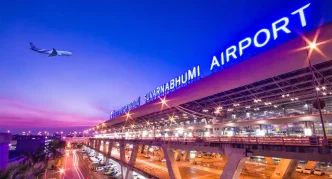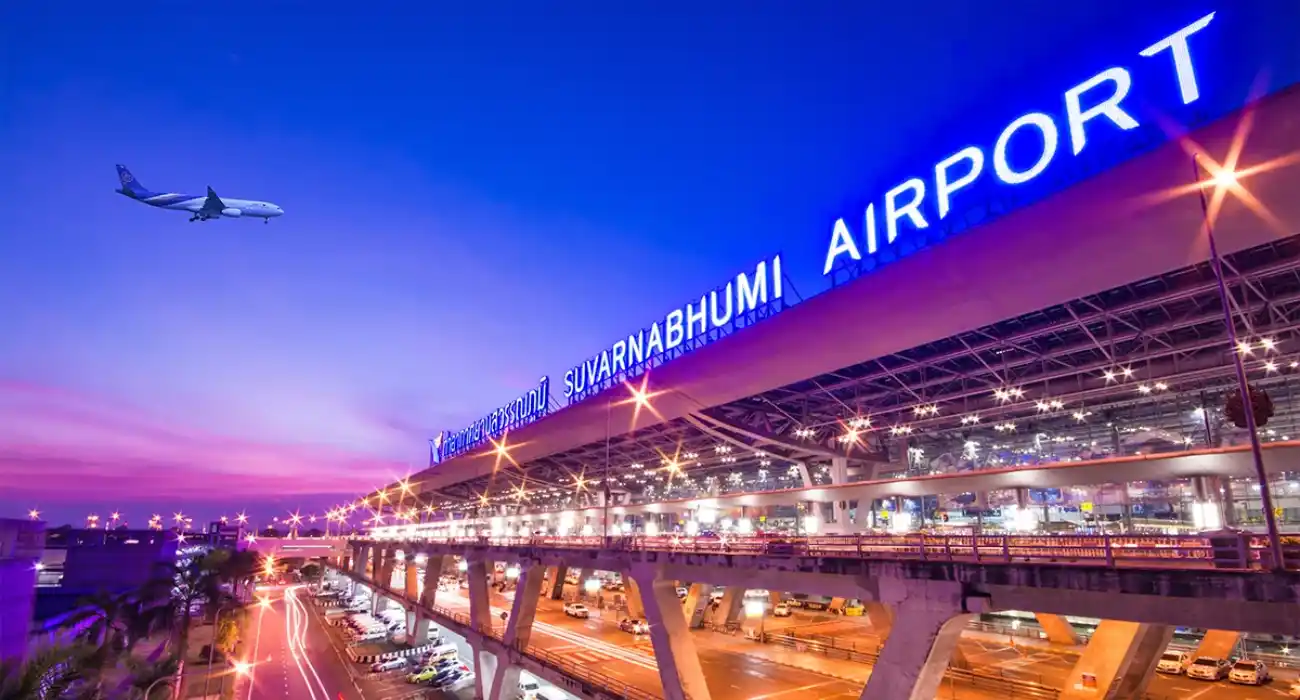Thailand, long hailed as the “Land of Smiles,” might be losing its lustre. The post-Covid tourist surge that promised to revive its economy has dwindled to a trickle, leaving Airports of Thailand (AOT), once the world’s most valuable airport operator, reeling. In 2025, AOT’s shares have plummeted by over 50%, erasing 460.7 billion baht (£10.2 billion) in market value and marking the steepest loss among global airport operators worth at least $100 million, according to Bloomberg data. This collapse, the worst in Asia, reflects a broader crisis: Thailand’s tourism industry, the backbone of its economy, is faltering under the weight of safety fears, declining Chinese visitors, and unmet expectations.
The Chinese Exodus
At the heart of Thailand’s woes is a sharp drop in Chinese tourists, who once flocked to its beaches and temples, spending heavily in duty-free shops that prop up AOT’s revenue. In May 2025, foreign tourist arrivals fell 13% year-on-year, with Chinese visitors leading the decline after a 30% slump in the first four months. A high-profile kidnapping of a Chinese actor in January, widely reported on social media, amplified safety concerns, prompting mass cancellations during the Lunar New Year. Bloomberg Intelligence notes a 94% surge in flight cancellations to Thailand in February, as Chinese travellers opted for Japan’s ski slopes or Singapore’s safety.
Chinese Tourist Quadrant 2025
Chinese Tourist Quadrant 2025
Yet, the kidnapping was more a catalyst than a cause. Thailand’s tourism sector was already grappling with a tarnished reputation. Posts on X highlight traveller complaints about scams, dual pricing for foreigners, and stolen hotel deposits, which have eroded trust. A 2025 Bloomberg report notes Thailand’s struggle to meet its ambitious target of 9 million Chinese visitors, as safety fears and negative perceptions persist.
A Fading White Lotus Glow
Thailand hoped for a reprieve from Western tourists, spurred by the Koh Samui-set season of HBO’s The White Lotus. The show delivered a temporary boost, but government data shows foreign arrivals dropped for the fourth consecutive month in May, slipping 14% to 2.6 million—the longest decline streak since the Covid-era border closures. Even high-spending European visitors, whom Thailand is now courting with new flight routes, haven’t offset the loss of Chinese and regional travellers.
AOT, which operates six of Thailand’s busiest airports, including Bangkok’s Suvarnabhumi and Phuket’s international hub, is feeling the pinch. Shrinking duty-free sales, a key revenue stream, have compounded the pain, exacerbated by the absence of a full-time chief executive to steer the company through the crisis. Analyst Denise Wong of Bloomberg Intelligence warns that without effective measures to revive Chinese demand, AOT’s financial downtrend will persist.
Economic Ripples
Thailand’s tourism sector, which accounts for nearly 20% of GDP, is a bellwether for its economy. The 2025 slump threatens jobs, from tuk-tuk drivers to hotel staff, and dims prospects for growth. AOT’s stock collapse mirrors broader market woes: Thailand’s SET Index fell 16% in 2025, making it the world’s worst-performing major stock market, as foreign investors fled amid economic pessimism.
Thailand Tourism Data
| Metric | Value |
|---|---|
| Foreign Tourist Arrivals (May 2025) | -13% year-on-year |
| Chinese Tourist Drop (Jan-Apr 2025) | -30% |
| AOT Stock Decline (2025) | -50% (~460.7 billion baht) |
| Tourism’s GDP Contribution | ~20% |
| SET Index Decline (2025) | -16% |
The government’s response has been uneven. Prime Minister Paetongtarn Shinawatra has vowed to bolster tourist safety, ordering increased border surveillance and recording a video message in Chinese to counter misinformation. Yet, plans to halve visa-free stays for foreign tourists to 30 days, announced in March 2025, signal a crackdown on visa overstays that risks deterring legitimate visitors.
Beyond Safety: What’s Keeping Tourists Away?
Could rising costs be deterring travellers? Thailand remains a budget-friendly destination compared to Western countries, with five-star hotels like Bangkok’s Anantara Siam costing £100 a night and Michelin-calibre meals under £50. However, inflation has driven up local prices, squeezing budget-conscious tourists. A 2018 Bloomberg report noted Thailand’s high tourism spend per visitor, but recent X posts suggest price gouging and dual pricing—higher rates for foreigners at attractions—are growing pain points.
Thailand Tourism Cost Comparison
7-Day Trip Cost Comparison (2025) – USD
Government flip-flopping on visas is another hurdle. While Thailand introduced visa waivers for Chinese tourists in 2023 to boost arrivals, the 2025 plan to cut visa-free stays to 30 days has sparked confusion. Frequent policy shifts, like reintroducing Covid-era entry rules in 2023, have frustrated travellers seeking predictability.
Thai scams are also a persistent issue. X users report widespread complaints, including:
Thai Tourism Scams
| Scam Type | Description | Source |
|---|---|---|
| Hotel Deposit Scams | Non-refunded deposits or fabricated damage claims. | Reddit r/ThailandTourism |
| Dual Pricing | Foreigners paying higher fees at attractions like temples or parks. | Wikipedia |
| Price Gouging | Overcharged taxi fares or inflated prices for goods. | VoyeGlobal |
| Tourist Traps | Misleading tour packages or fake gem shops. | SmarterTravel |
| Pickpocketing and Petty Theft | Common in crowded areas like Bangkok’s Khao San Road. | TripAdvisor Forum |
| Jet Ski Scams | Operators claim fake damages, often with police support. | BBC News |
These grievances, also amplified amongst tourists on social media, compound Thailand’s safety concerns, particularly among Chinese tourists wary after high-profile incidents.
A Path Forward?
Thailand’s tourism crisis is a test of resilience for a nation that welcomed 9.3 million visitors in 2022, surpassing forecasts. To recover, it must rebuild trust, starting with robust safety measures and transparent pricing. Courting European and regional travellers is a start, but China’s 9 million visitors pre-Covid remain the prize.
For AOT, the road is steeper. Its airports, once strained by tourist hordes, now face undercapacity and revenue shortfalls. Appointing a permanent CEO and diversifying income beyond duty-free sales are urgent priorities. As Thailand fights to reclaim its tourism crown, the world watches—not just for its beaches, but for what its struggles reveal about the fragility of tourism-dependent economies in a post-Covid world.















